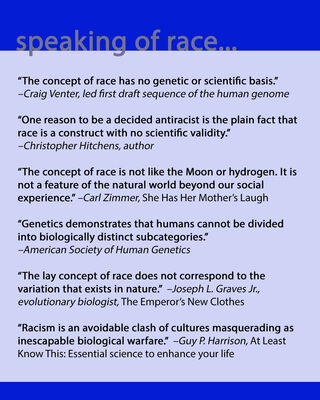Bias
What Is the Best Way to Defeat Racist Beliefs?
A specific set of facts is the best antidote for the poison of racism.
Posted May 17, 2022 Reviewed by Michelle Quirk
Key points
- Racism is usually due to a failure of education.
- Confusing cultural games for genetic destiny energizes racism with counterfeit but effective power.
- Berating a person for expressing a racist idea is unlikely to be productive.
To thrive within a healthy brain, biological racism relies on its host to misunderstand or never learn some combination of fundamental facts about human culture, history, evolution, genetics, and the problematic ways the subconscious mind protects bogus beliefs. Fortunately, a mere smattering of key information helps most people escape and evade racist beliefs.
Cultural Creations
Many racist ideas can seem reasonable if one is unaware that the human categories they depend on are not coherent, logical, or scientific biological subsets of our species. We know they are cultural creations because the rules of inclusion and exclusion that create racial systems are in constant flux and include many irreconcilable contradictions. Races change with the winds and whims of cultural/historical forces because they were never based on real genetic borders or scientific criteria in the first place. We made them up and continue to make them up. This matters because confusing cultural games for genetic destiny energizes racism with a counterfeit but very effective power.
Racism is a failure of education, and belief in biological races acts as a heavy fog that can make the plainest facts about ourselves feel wrong, impossible even. It would be helpful, for example, if it were common knowledge that we are a very young and closely related species and that all living humans today are about 99.9 percent genetically identical. Why doesn’t everyone understand by now that—contrary to ceaseless assertions—disease rates, IQ test-score averages, and sports results do not prove the validity or rankability of biological races.
Only when such claims are viewed through deceptive cultural prisms do they appear to be anything other than ludicrous. Why are most people still surprised to learn that randomly selected dark-skinned East Africans, West Africans, and southern Africans are likely to be more genetically distant from each other (less related) than any one of them is to a randomly selected Asian or light-skinned European? Why isn’t everyone aware that biological races—promoted as immutable natural categories objectively based on genes and kinships—were defined and organized very differently in the past and vary wildly between societies today?
Assistance, Not Aggression
Berating a person for expressing a racist idea is unlikely to be productive. Given the way our brains work, blunt aggression tends to provoke a deeper commitment and more vigorous defense of beliefs. It is only human to be hoodwinked by tradition, authority figures, misperceptions, confirmation bias, etc. Therefore, an offer of assistance is a more sensible response. Anyone who has fallen into the murk of racism needs a flashlight and a ladder, not hatred and rejection. The recommended reading list I offer below is meant to be a helping hand because learning correct information is the best remedy for ignorance and confusion.

It is important to keep in mind that the problem of racism extends far beyond the most obvious and obnoxious racists among us. More important than them are the greater numbers of well-meaning people who, despite best intentions, have racist notions bouncing around inside their heads. These people can be moved by reason much more easily than card-carrying Klan members. Having written and talked about race and racism for many years, I know from experience that exposure to logical concepts and evidence-based information works.
I expect that many people will reject the idea of battling racism with a light but strategic education in anthropology, history, and genetics. But what is their solution? Thoughts and prayers? Keep hoping for universal love and tolerance to show up and win the day? Sometimes the best and, perhaps, only answer is not flashy and complicated. Call me a silly optimist, but I believe that virtually all those who have not learned about their species are capable of learning at least the bare minimum necessary to defuse all racist beliefs.
Please share this short recommended-reading list with as many people as possible. These 10 books illuminate the relevant science and history without becoming overly opinionated, political, or complex. They present a mountaintop view of humanity and explain in plain language why biological racism is not only individually cruel and socially destructive but also extraordinarily stupid. If we think of racism as a generalized cognitive illness that is dependent on the absence of key knowledge, then these books represent both vaccine and cure. Share this list and spread the word. Maybe this is how we finally escape racism as a species, by reaching and teaching, one mind at a time.
Ten Books that Topple Racist Beliefs
- Race: Are We So Different? by Alan H. Goodman, Yolanda T. Moses, and Joseph L. Jones
- Everyone Is African: How Science Explodes the Myth of Race, by Daniel J. Fairbanks
- Racism, Not Race: Answers to Frequently Asked Questions, by Joseph L. Graves Jr. and Alan H. Goodman
- The Myth of Race, by Jefferson M. Fish
- How to Argue with a Racist, by Adam Rutherford
- The Journey of Man: A Genetic Odyssey, by Spencer Wells
- Race?: Debunking a Scientific Myth, by Ian Tattersall
- Race and Intelligence: Separating Science From Myth, edited by Jefferson M. Fish
- The Myth of Race: The Troubling Persistence of an Unscientific Idea, by Robert Sussman
- Race and Reality: What Everyone Should Know About Our Biological Diversity, by Guy P. Harrison


